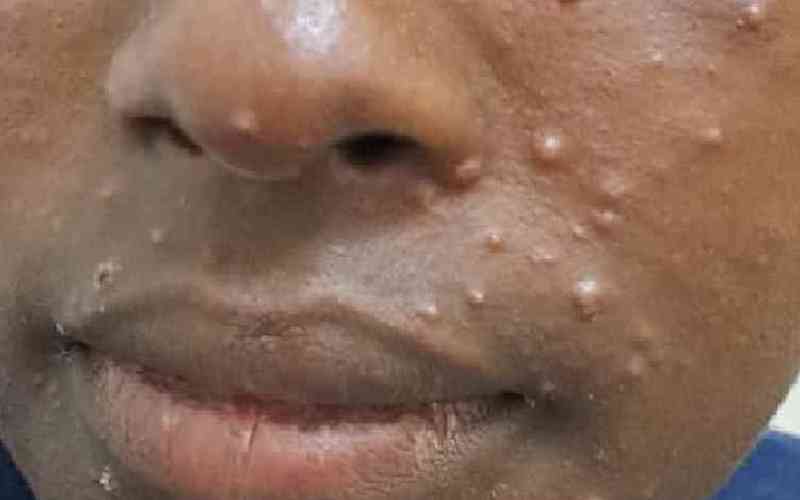
While Kenya has been identified as one of the countries at high risk of exposure to the Mpox virus, obstacles in accessing the vaccine including limited funding and competing interests threaten the country’s ability to contain the spread of the virus.
Mpox is a rare disease which spreads when one comes into contact with an animal or a person infected with a virus, which leads to rashes and flu-like symptoms. The rash starts as flat, red bumps, which can be painful.
Those bumps turn into blisters which fill with pus. Eventually, the blisters crust over and fall off. The whole process can last two to four weeks. You can get sores on your mouth, face, hands, feet, penis, vagina or anus.
To contain the spread of the virus, it is important to get vaccinated before or as soon as possible after exposure. However, due to limited availability of the vaccine, the Ministry of Health says the country is currently concentrating on surveillance and testing of suspected cases mostly.
The two vaccines currently in use for Mpox are recommended by the World Health Organisation's Strategic Advisory Group of Experts on Immunisation and are also approved by WHO-listed national regulatory authorities as well as by individual countries. Kenya has not approved any Mpox vaccine for emergency use to stop the disease from spreading.
The country requires makers of the vaccines to register them with the Pharmacy and Poisons Board for approval but this process can be expedited for emergency use via an Emergency Use Listing (EUL) programme. The EUL procedure is an authorisation process, specifically developed to expedite the availability of unlicensed medical products like vaccines that are needed in public health emergency situations.
Last week, World Health Organisation (WHO) Director-General Tedros Adhanom triggered the process for EUL for Mpox vaccines which will accelerate vaccine access for lower-income countries which have not yet issued their own national regulatory approval.
WHO is working with countries and vaccine manufacturers on potential vaccine donations, and coordinating with partners through the interim Medical Countermeasures Network to facilitate equitable access to vaccines, therapeutics, diagnostics and other tools.
According to the WHO, there have been more than 14,000 cases and 524 deaths from Mpox in Africa this year. While there has only been two cases of Mpox detected in Kenya, health experts believe that there could be more who have been exposed to the virus. This is because not everyone with Mpox develops all the symptoms.
You can have Mpox and not know it, however, even if you don’t show many signs of infection, it’s possible that you can still spread it to others through prolonged close contact. You can also get Mpox by coming into contact with recently contaminated materials like clothing, bedding and other linens used by a person or animal who’s infected. This is why extensive vaccination against the Mpox virus is crucial.
Indeed, vaccination has always proven to be a game-changer in fighting similar crises. The world is fresh from the deadly Covid-19 pandemic, which ravaged the rich and the poor nations alike.
With Covid-19 came the most aggressive search for a vaccine to help prevent the deaths of significant portions of our population. Months into the pandemic, several vaccines were successfully developed.
Early this year, the WHO said that such vaccines helped to save the lives of 1.4 million people in Europe alone and registered a 57 per cent in reduction of Covid-related deaths.
Most of those saved were the most vulnerable in our global population, those aged 60 and above and with underlying conditions. Once again, society's most vulnerable and those in the frontline are counting on sufficient vaccinations to help prevent a potential crisis that could also affect our vulnerable healthcare system.
 The Standard Group Plc is a multi-media organization with investments in media
platforms spanning newspaper print operations, television, radio broadcasting,
digital and online services. The Standard Group is recognized as a leading
multi-media house in Kenya with a key influence in matters of national and
international interest.
The Standard Group Plc is a multi-media organization with investments in media
platforms spanning newspaper print operations, television, radio broadcasting,
digital and online services. The Standard Group is recognized as a leading
multi-media house in Kenya with a key influence in matters of national and
international interest.
 The Standard Group Plc is a multi-media organization with investments in media
platforms spanning newspaper print operations, television, radio broadcasting,
digital and online services. The Standard Group is recognized as a leading
multi-media house in Kenya with a key influence in matters of national and
international interest.
The Standard Group Plc is a multi-media organization with investments in media
platforms spanning newspaper print operations, television, radio broadcasting,
digital and online services. The Standard Group is recognized as a leading
multi-media house in Kenya with a key influence in matters of national and
international interest.











